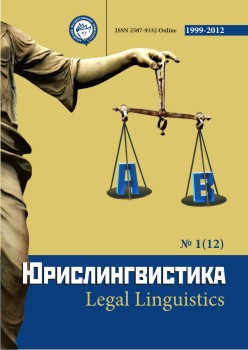У ИСТОКОВ НАЦИОНАЛЬНОЙ ЮРИСЛИНГВИСТИКИ – ПЕРВАЯ РАБОТА В. Д. КАТКОВА
Abstract
В статье рассматриваются основные философско-правовые идеи первого в мире юриста, который стал систематически исследовать язык права, украинского теоретика права Василия Даниловича Каткова (1867–1919)Downloads
Metrics
References
Берман, Г. Дж. Вера и закон: примирение права и религии. М., Ad Marginem, 1999 . – 431 с.
Катков, В. Д. К анализу основных понятий юриспруденции. Харьков: Университетская типография, 1905. – 462 с.
Катков, В. Д. Наука и философия права. Берлин, 1901. – Кн. VIII. – 115 с.
Катков В. Д. Jurisprudentiаe novum organum (Реформированная общим языковедением логика и юриспруденция) / Записки Новороссийского Имп.ун-та. Юридический факультет. – Т.1: Цивилистика. – Вып.12. – 1913. – 509 с.
Нерсесянц, В. С. Общая теория права и государства. М., 1999. – 552 с.
Титов, В. Д. Историческое развитие философско – логических концепций языка права. Харьков, 2009.
Copyright (c) 2017 Юрислингвистика

This work is licensed under a Creative Commons Attribution 4.0 International License.
The authors, which are published in this journal, agree to the following conditions:
1. Authors retain the copyright to the work and transfer to the journal the right of the first publication along with the work, at the same time licensing it under the terms of the Creative Commons Attribution License, which allows others to distribute this work with the obligatory indication of the authorship of this work and a link to the original publication in this journal .
2. The authors retain the right to enter into separate, additional contractual agreements for the non-exclusive distribution of the version of the work published by this journal (for example, to place it in the university depository or to publish it in a book), with reference to the original publication in this journal.
3. Authors are allowed to post their work on the Internet (for example, in a university repository or on their personal website) before and during the review process of this journal, as this may lead to a productive discussion, as well as more links to this published work (See The Effect of Open Access).











